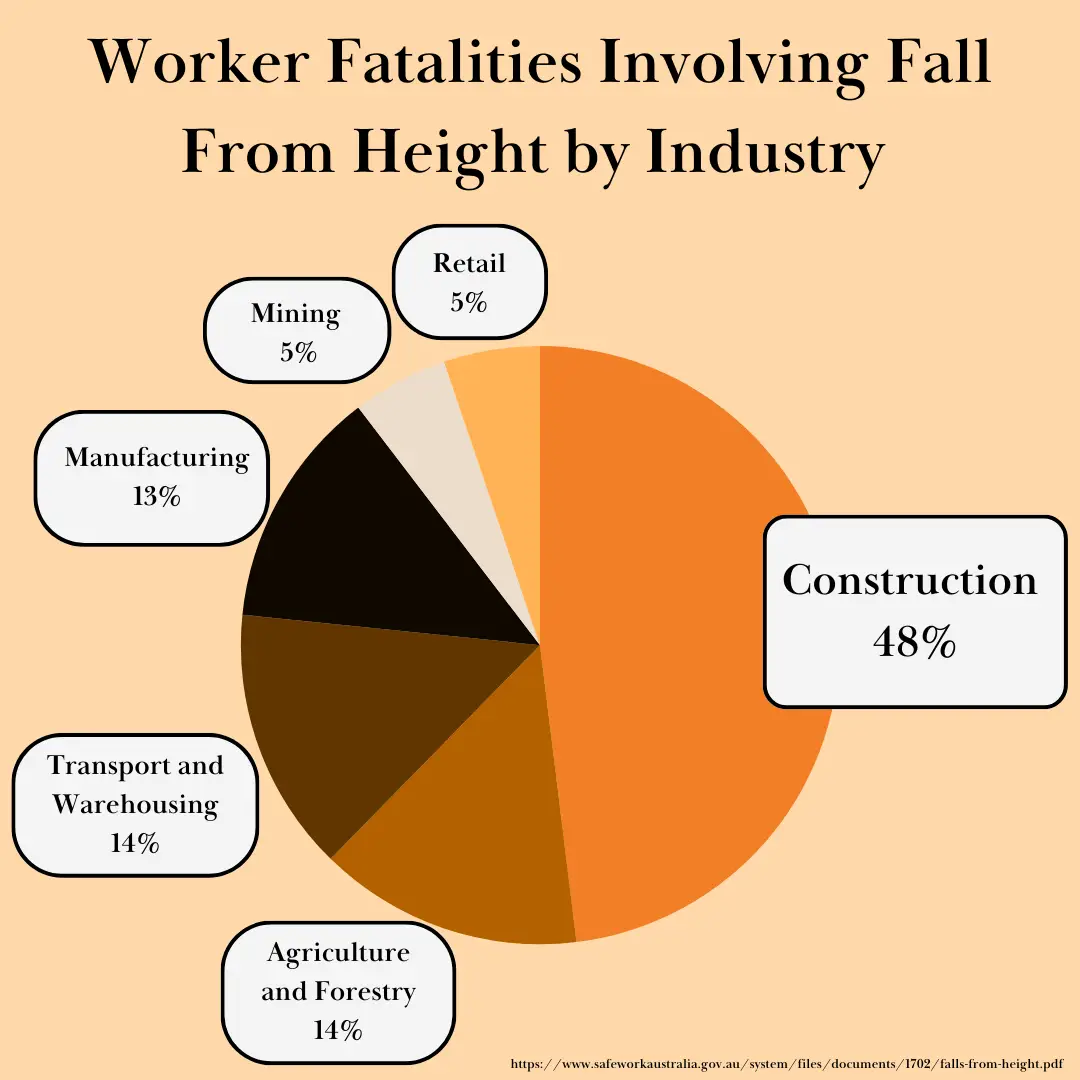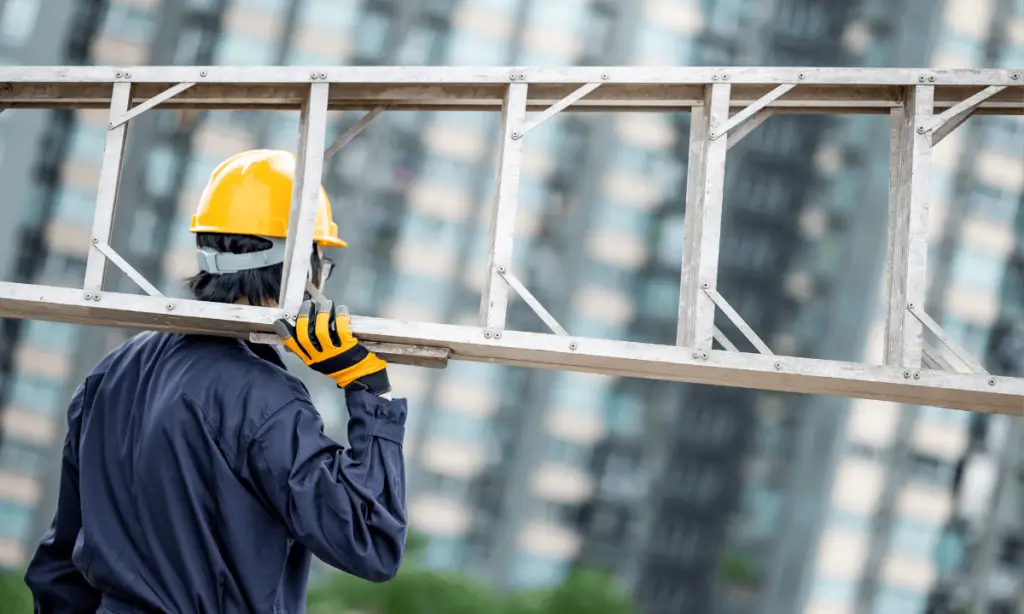Ladder falls at work can result in serious injuries, leaving employees unable to work and facing growing medical expenses. If you’ve suffered a fall from a ladder in the workplace, you may be entitled to a workers’ compensation claim. In Australia, workplace health and safety laws ensure that employees injured in work-related accidents can seek financial assistance to cover medical costs, lost wages, and rehabilitation.
This article will guide you through the essential steps of filing a ladder fall compensation claim, what you can expect from the process, and how to maximise your payout.
Whether your injury was caused by faulty equipment, a lack of proper training, or unsafe working conditions, understanding your rights is critical to recovering physically and financially.

I Fell Off A Ladder At Work - Can I Claim Workers Compensation?
If you’ve fallen from a ladder at work and sustained an injury, you may be eligible to make a workers’ compensation claim. According to SafeWork Australia, falls from heights remain a leading cause of workplace injuries and fatalities, with the construction industry bearing the highest risk.
Workers’ compensation laws are in place to ensure employees injured during the course of their duties receive financial and medical support, regardless of who is at fault. However, your eligibility for a claim depends on meeting specific criteria.
Key Factors for Eligibility
To make a successful workers’ compensation claim for a ladder fall injury, you’ll typically need to prove the following:
The Accident Occurred During Work-Related Activities
The incident must have taken place while performing tasks required for your job. This includes using a ladder to access shelves, perform maintenance, or complete any work-related duty.The Injury Was Caused by the Fall
You must demonstrate that the injuries sustained were a direct result of the ladder fall.Reporting the Incident
You must have reported the accident to your employer as soon as possible. Timely reporting ensures proper documentation and strengthens your claim.You Were an Employee or Contractor
You must be classified as an employee or contractor covered by your employer’s workers’ compensation insurance. Self-employed individuals may need to look at personal insurance coverage.If you’re unsure whether your fall is eligible for a workers compensation claim, or to find out more information about the process, our team of experienced workers compensation lawyers are here to help on a No Win, No Fee basis. Contact us today for a free claim assessment to find out what you may be eligible to claim.

Common Injuries Caused by Falling from a Ladder at Work
Falling from a ladder at work can result in a wide range of injuries, from minor bruises to severe, life-altering conditions. The nature and severity of these injuries often depend on factors such as the height of the fall, the angle of impact, and whether the worker struck any objects during the fall.
Here are some of the most common injuries sustained in ladder fall related workplace accidents:
Fractures and Broken Bones
Falls often result in fractures, particularly in the wrists, arms, ankles, and legs as workers instinctively try to break their fall. More serious accidents may cause broken ribs or pelvis injuries, requiring extensive recovery periods.
Read more about fractures and broken bone compensation claims here.
Head and Brain Injuries
A fall from a significant height can lead to head trauma, including concussions and traumatic brain injuries (TBI). These injuries may result in long-term cognitive, emotional, or physical impairments, especially if protective gear was not worn.
Learn how we’ve helped clients with brain injury compensation claims here.
Spinal Cord and Back Injuries
Landing on the back or neck during a fall can cause serious spinal injuries, including herniated discs, fractures, or, in severe cases, partial or complete paralysis. Back injuries are among the most debilitating and often require lengthy medical treatment and rehabilitation.
See how we handle spinal cord and back injury claims here.
Soft Tissue Injuries
Torn ligaments, muscle strains, and deep bruising are common outcomes of ladder falls. While not always life-threatening, these injuries can significantly impact mobility and require ongoing physiotherapy.
If your claim is accepted, you’ll begin receiving entitlements, such as weekly payments or medical expense coverage, based on your injury and circumstances.
Click here to read about tendon injury claims.
Internal Injuries
Falls can also cause internal injuries, such as organ damage or internal bleeding, which may not be immediately apparent. Prompt medical attention is critical to identifying and treating these injuries effectively.
Why Early Medical Attention is Essential
Even if your injuries seem minor initially, it’s crucial to seek medical attention immediately after a ladder fall. Some injuries, like concussions or internal damage, may not show symptoms right away but can worsen over time.
If you’ve suffered any of these injuries from a workplace ladder accident, you may be entitled to workers’ compensation. Seeking legal advice can help you understand your rights and ensure you receive the support you need to recover.
What Compensation Am I Entitled To After Falling From A Ladder At Work?
If you’ve fallen from a ladder at work and sustained an injury, you may be entitled to various forms of compensation under Australian workers’ compensation laws. These benefits aim to ease the financial and physical burdens of your injury, helping you recover and return to normal life.
Here’s a breakdown of the compensation you may be eligible to receive:
Weekly Payments for Lost Wages
If your injury after falling from a ladder prevents you from working, you can receive income support to replace part of your lost wages.
- First 13 Weeks: Payments are calculated based on 95% of your pre-injury average weekly earnings.
- Weeks 14–130: You may receive up to 80% of your pre-injury average weekly earnings if you’re unable to work or if you’re working less than 15 hours per week.
- Beyond 130 weeks: After this time, payments will stop unless you have been assessed at above 20% WPI. In this instance, payments of 80% pre-injury average weekly earnings will continue until retirement or until a Common Law Claim is made. Click here to read more about WPI calculations.
Medical and Treatment Expenses
Workers’ compensation covers the costs of medical treatment related to your injury, including:
- Doctor consultations
- Hospital stays
- Prescription medications
- Physiotherapy and rehabilitation services
Rehabilitation costs may also include support for workplace adjustments or specialised equipment to aid recovery.
Permanent Impairment Compensation
If your injury is severe, you may also be entitled to a lump sum payment. This is determined through a Whole Person Impairment (WPI) assessment, which is completed by an Independent Medical Examiner (IME). The assessment is generally conducted at least 6 months after the initial diagnosis. Our team of workers compensation lawyers are able to organise this assessment for you.
In New South Wales, to qualify for a lump-sum payment for permanent impairment due to a work-related injury, the following thresholds apply:
- Physical Injuries: A minimum of 11% Whole Person Impairment (WPI) is required unless you are an exempt worker (a sworn officer, paramedic, firefighter or coal miner)
- Psychological Injuries: A minimum of 15% WPI is necessary.
These thresholds are established to acknowledge the long-term impact of your injury on your life. It’s important to note that these lump-sum payments are in addition to any weekly payments, medical, and related expenses you may be entitled to under the workers’ compensation system.

How to Make a Workers Compensation Claim After Falling From A Ladder At Work
Seek Medical Support and Diagnosis
The first and most crucial step is to visit your GP in order to:
- Diagnose your condition: A doctor will be able to determine the seriousness of your injuries and asssess your ability to work.
- Establish the work connection: Your doctor must document how your injury was caused by your job. This connection is vital to your claim.
- Obtain a Work Capacity Certificate: This certificate confirms your diagnosis, the impact of your condition on your ability to work, and the treatment you require.
Notify Your Employer
Under NSW law, you are required to inform your employer about your injury as soon as possible. You must provide enough information for them to notify their insurer.
Lodge Your Workers Compensation Claim
Once your employer is notified, you can submit your claim through their workers compensation insurer. To do this, you’ll need:
- A completed Workers Compensation Claim Form.
- Your Work Capacity Certificate and any supporting medical reports.
- Relevant workplace documents, such as incident reports, emails, or witness statements, to support your case.
Insurer’s Decision
The insurer will assess your claim and determine whether to accept or deny it. They may contact your healthcare providers or employer for additional information during their investigation.
If your claim is accepted, you’ll begin receiving entitlements, such as weekly payments or medical expense coverage, based on your injury and circumstances.
Why Use a Personal Injury Lawyer For My Workers Compensation Claim?
Navigating a workers’ compensation claim can feel overwhelming, particularly when dealing with severe injuries from a workplace fall.
This is where having a knowledgeable workers’ compensation lawyer by your side can make all the difference. With years of experience, we understand what it takes to build a strong and successful claim.
Our dedicated team of workers’ compensation lawyers is here to:
- Establish Your Claim
We gather extensive medical records and workplace evidence to demonstrate the link between your injuries and your job conditions. - Protect Your Rights Against Insurer Challenges
Our team is experienced in handling common insurer tactics such as claim denials, delays, or disputes, ensuring your case is treated with the fairness it deserves. - Maximise Your Compensation
We work tirelessly to secure all benefits you’re entitled to, including weekly payments, medical expenses, and lump sum compensation for permanent impairment. We can also advise on potential claims for work injury damages. - Simplify the Process
From managing communication with insurers to lodging claims and representing you in disputes, we take care of the complexities, so you can focus on your recovery with confidence.
Can I Make A Common Law Claim After Falling From a Ladder At Work?
If you’ve fallen from a ladder at work and sustained injuries, you might wonder if you can also make a common law claim in addition to a workers’ compensation claim. The short answer is: yes, in certain circumstances, you may be eligible to make a common law claim.
Common law claims, also referred to as work injury damages claims, are separate from standard workers’ compensation and are designed to address negligence on the part of your employer.
In Australia, you can make a common law claim if:
You’ve Reached a Minimum Threshold of Impairment
Your injuries must be assessed as being 15% Whole Person Impairment (WPI) or greater.Your Injury Was Caused by Employer Negligence
You’ll need to prove that your employer failed to provide a safe working environment, proper training, or well-maintained equipment, such as a secure ladder.
A common law claim represents a final settlement of your entitlements for a workplace injury. By accepting a lump sum payment through a work injury damages claim, you forfeit your rights to receive any future weekly payments or medical benefits under the workers’ compensation system.
While a common law claim may result in a larger lump sum to cover your economic losses, it’s important to understand that this settlement replaces any ongoing workers’ compensation support.
This decision should be made carefully, taking into account your current financial situation and future needs. Our skilled work injury damages lawyers are here to assist you throughout the process. We’ll provide clear and straightforward advice, at no cost to you, about your entitlements so you can make a well-informed choice that supports your long-term well-being.
No Out-of-Pocket Costs with Withstand Lawyers
A common concern for many people considering a workers’ compensation claim is, “How much will this cost me?” The reassuring answer is that making a claim won’t cost you anything. Whether you’re just starting your claim or resolving a dispute, you won’t face any out-of-pocket legal expenses.
This is made possible by the Independent Review Office (IRO), which covers all legal fees and associated costs for workers’ compensation claims. These costs include obtaining evidence, arranging assessments with independent medical experts, and managing the complexities of your case. Importantly, these expenses aren’t deducted from your compensation, and they’re fully covered regardless of the claim’s outcome.
This allows you to focus entirely on your recovery without the stress of upfront costs, hidden charges, or financial burdens. At Withstand Lawyers, we collaborate closely with the IRO to provide our clients with expert legal representation at no cost to them.

Why Choose Withstand Lawyers for Your Workers Compensation Claim?
Navigating a mental health workers compensation claim can be overwhelming, but you don’t have to face it alone. At Withstand Lawyers, we understand the emotional and financial toll a workplace injury can take, and we’re here to guide you every step of the way. Here’s why so many clients trust us with their claims:
Decades of Experience
With years of experience, we’ve helped countless individuals secure compensation for their injuries by tailoring our approach to their unique circumstances.No Out-of-Pocket Costs
The Independent Review Office (IRO) covers all legal fees and disbursements, meaning no hidden costs, no deductions, and no financial risk for your claim.Compassionate and Personalised Support
We combine legal expertise with genuine empathy, taking the time to understand your story and provide clear, supportive guidance throughout the process.Proven Track Record of Success
From weekly payments to lump sum compensation and work injury damages claims, we’ve achieved life-changing results for our clients.Free Claim Assessment
Unsure about your eligibility? We offer a free, no-obligation assessment to explore your options, explain your entitlements, and set you on the right path.
Choose Withstand Lawyers for dedicated, experienced support focused on achieving the best outcome for your case.
Contact us today for your free claim assessment.

Issa Rabaya
• Bachelor of Laws
• Graduate Diploma in Legal Practice
• Approved Legal Service Provider to the Independent Review Office
• Member of the Law Society

Issa Rabaya
• Bachelor of Laws
• Graduate Diploma in Legal Practice
• Approved Legal Service Provider to the Independent Review Office
• Member of the Law Society




